Intro
Boost potassium intake with 7 rich foods, including bananas, spinach, and sweet potatoes, to support healthy blood pressure, muscle function, and bone health, while preventing deficiency and related diseases like hypokalemia.
Potassium is an essential mineral that plays a crucial role in maintaining various bodily functions, including heart health, blood pressure, and bone density. Despite its importance, many people do not consume enough potassium-rich foods in their diet, leading to potential health problems. In this article, we will delve into the world of potassium-rich foods, exploring their benefits, types, and ways to incorporate them into your daily meals.
Potassium is a vital electrolyte that helps regulate fluid balance, nerve function, and muscle contractions. It also assists in maintaining a healthy blood pressure, reducing the risk of cardiovascular diseases, and promoting bone health. The recommended daily intake of potassium varies based on age, sex, and overall health, but most adults require around 4,700 milligrams per day. Unfortunately, many people fall short of this target, with some studies suggesting that up to 98% of adults do not meet the daily recommended intake.
The consequences of potassium deficiency can be severe, ranging from mild symptoms like fatigue, weakness, and muscle cramps to more serious conditions like arrhythmias, respiratory problems, and even paralysis. Furthermore, a potassium-deficient diet has been linked to an increased risk of chronic diseases, such as hypertension, stroke, and osteoporosis. On the other hand, consuming potassium-rich foods can have numerous health benefits, including reducing blood pressure, promoting bone health, and supporting overall well-being.
Potassium Rich Foods Overview
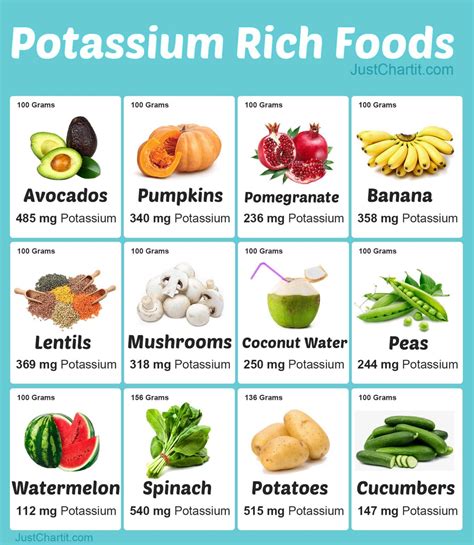
Potassium-rich foods are abundant and varied, making it easy to incorporate them into your diet. Some of the richest sources of potassium include leafy greens, fruits, vegetables, nuts, and whole grains. In this section, we will explore some of the top potassium-rich foods, their nutritional benefits, and ways to prepare them.
Leafy Greens
Leafy greens like spinach, kale, and collard greens are among the richest sources of potassium. One cup of cooked spinach, for example, contains around 840 milligrams of potassium, while one cup of cooked kale provides approximately 900 milligrams. These leafy greens are also rich in other essential nutrients like iron, calcium, and vitamins A and K.Top Potassium Rich Foods
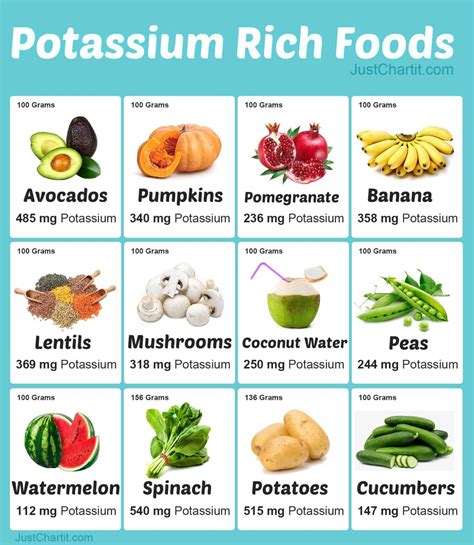
Some of the top potassium-rich foods include:
- Bananas: One medium-sized banana contains around 422 milligrams of potassium.
- Sweet potatoes: One medium-sized sweet potato provides approximately 542 milligrams of potassium.
- Avocados: One medium-sized avocado contains around 708 milligrams of potassium.
- Mushrooms: One cup of cooked mushrooms provides approximately 555 milligrams of potassium.
- Fatty fish: Fatty fish like salmon and tuna are rich in potassium, with a 3-ounce serving providing around 534 milligrams.
Fruits
Fruits like bananas, apricots, and prunes are rich in potassium, making them an excellent addition to your diet. One cup of dried apricots, for example, contains around 1,478 milligrams of potassium, while one cup of prunes provides approximately 1,274 milligrams. Fruits are also rich in other essential nutrients like vitamins, minerals, and antioxidants.Potassium Rich Foods Benefits
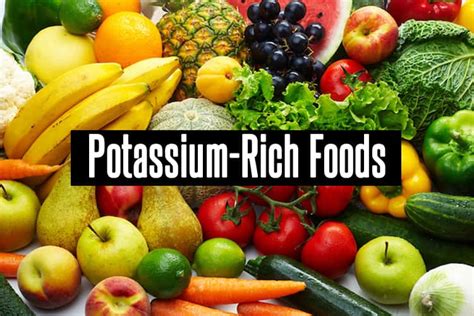
The benefits of consuming potassium-rich foods are numerous and well-documented. Some of the key benefits include:
- Reducing blood pressure: Potassium helps lower blood pressure by balancing out the effects of sodium and promoting healthy blood vessel function.
- Promoting bone health: Potassium helps regulate calcium metabolism, reducing the risk of osteoporosis and fractures.
- Supporting muscle function: Potassium is essential for muscle contractions and relaxations, making it an essential mineral for athletes and individuals with physically demanding jobs.
- Reducing the risk of chronic diseases: Consuming potassium-rich foods has been linked to a reduced risk of cardiovascular diseases, stroke, and other chronic conditions.
Nuts and Seeds
Nuts and seeds like almonds, pumpkin seeds, and sunflower seeds are rich in potassium, making them an excellent snack or addition to your meals. One ounce of almonds, for example, contains around 718 milligrams of potassium, while one ounce of pumpkin seeds provides approximately 921 milligrams. Nuts and seeds are also rich in healthy fats, protein, and fiber.Potassium Rich Foods List
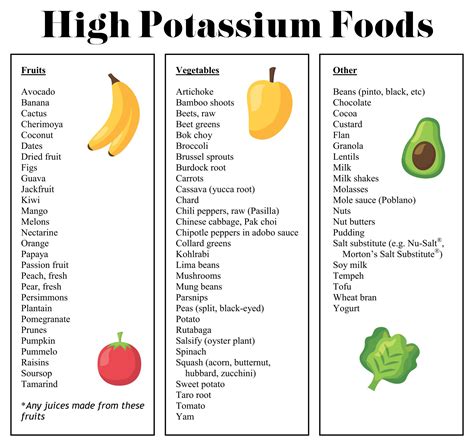
Here is a comprehensive list of potassium-rich foods:
- Leafy greens: spinach, kale, collard greens, and Swiss chard
- Fruits: bananas, apricots, prunes, and avocados
- Vegetables: sweet potatoes, mushrooms, and broccoli
- Nuts and seeds: almonds, pumpkin seeds, sunflower seeds, and chia seeds
- Whole grains: brown rice, quinoa, and whole-wheat bread
- Fatty fish: salmon, tuna, and mackerel
Whole Grains
Whole grains like brown rice, quinoa, and whole-wheat bread are rich in potassium, making them an excellent addition to your meals. One cup of cooked brown rice, for example, contains around 442 milligrams of potassium, while one cup of cooked quinoa provides approximately 718 milligrams. Whole grains are also rich in fiber, vitamins, and minerals.Potassium Rich Foods Recipes
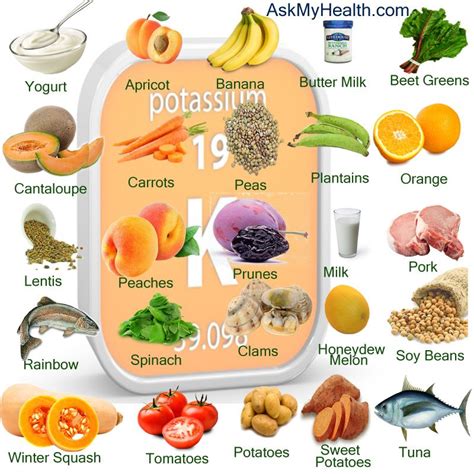
Here are some delicious and easy-to-make recipes that incorporate potassium-rich foods:
- Spinach and feta stuffed chicken breast
- Baked sweet potato with avocado salsa
- Grilled salmon with roasted vegetables
- Quinoa and black bean bowl with roasted sweet potatoes
- Banana and almond smoothie bowl
Potassium Deficiency
A potassium deficiency can have severe consequences, ranging from mild symptoms like fatigue and weakness to more serious conditions like arrhythmias and respiratory problems. The causes of potassium deficiency include: * Inadequate diet: Not consuming enough potassium-rich foods can lead to a deficiency. * Certain medications: Some medications like diuretics and laxatives can cause potassium loss. * Underlying medical conditions: Certain medical conditions like kidney disease and hormonal imbalances can affect potassium levels.Potassium Rich Foods FAQs
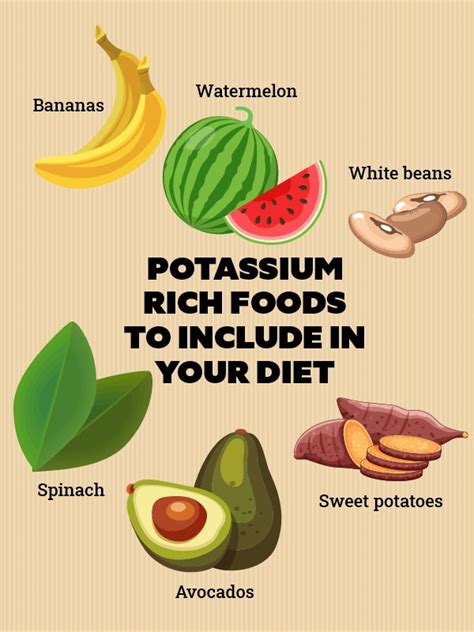
What are the symptoms of potassium deficiency?
+The symptoms of potassium deficiency include fatigue, weakness, muscle cramps, and heart palpitations. In severe cases, it can lead to arrhythmias, respiratory problems, and even paralysis.
How can I increase my potassium intake?
+You can increase your potassium intake by consuming potassium-rich foods like leafy greens, fruits, vegetables, nuts, and whole grains. You can also consider taking potassium supplements after consulting with your healthcare provider.
Can I get too much potassium?
+Yes, it is possible to get too much potassium. Excessive potassium intake can lead to symptoms like nausea, vomiting, and diarrhea. In severe cases, it can cause cardiac arrhythmias and even death. It is essential to consume potassium-rich foods in moderation and consult with your healthcare provider if you have any concerns.
In conclusion, incorporating potassium-rich foods into your diet is essential for maintaining overall health and well-being. With the numerous benefits and variety of potassium-rich foods available, it is easy to make informed choices and promote a healthy lifestyle. We encourage you to share your favorite potassium-rich recipes, ask questions, and engage in discussions about the importance of potassium in your diet. By working together, we can promote a culture of healthy eating and wellness, and reduce the risk of chronic diseases associated with potassium deficiency.
